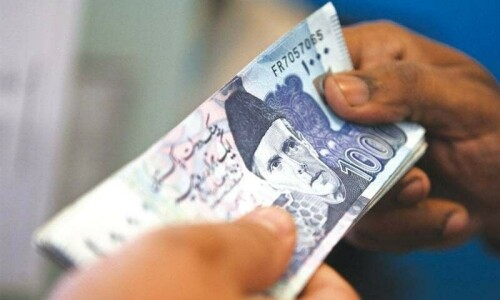 PATIENCE is running thin. Nervousness is giving way to depressed feelings as the United States’ frantic search for ‘good news’ before presidential elections leads it to extend its limits of war zone to include the troubled border areas of Pakistan.
PATIENCE is running thin. Nervousness is giving way to depressed feelings as the United States’ frantic search for ‘good news’ before presidential elections leads it to extend its limits of war zone to include the troubled border areas of Pakistan.
Investors and businessmen are unhappy. Some have switched off their mobiles and immersed themselves deeper into their faith to pray for a way out of the current difficult patch.
“During Ramazan I always withdraw myself from the worldly pursuits to concentrate on ‘Ibadat’ (prayers). I am a heart patient and it has already been taxing”, the man said referring to the worsening economic indicators.
“This year I am not using even my cell phone to shut out more bad news”, a Memon businessman, who is believed to have incurred heavy losses in the capital market recently, told Dawn over landline from his home in Karachi.
“I spend a better part of my day in mosque or at home. My office in commercial centre opens every day but closes early for lack of activity in the market”, Javed a property dealer told Dawn. He said that some queries are made but deals are not being struck for the big gap between demand and offered price. The numbers for property transactions in Karachi are at a five-year low.
There are no ready-to-implement easy solutions available anywhere to address the current set of complex interwoven economic problems in a globalised world. “The old recipes are not effective as is evident from the US-driven financial crisis,” commented an analyst.
Facing a worsening economic situation, the government recently constituted a committee and invited economists from all over the country for a two-day brainstorming session in Islamabad to ponder on the key issue of devising a strategy. The government is reported to be keen to shift gear and redirect the economy towards production-led growth.
“The government considers consumption-led growth strategy of the Musharraf/Aziz era to be responsible for many economic woes of the country”, a source privy to the meeting told Dawn.
Enlightening on the purpose of the exercise, a high ranking government official told Dawn from Islamabad: “The resource-starved government needs immediate relief. It believes it would be easier to solicit support from bilateral and multilateral development partners if it is armed with a clear workable plan for the revival of the economy”.
“The government wants to evolve a broad-based home grown strategy for production-led development and growth for next five years”, said another participant.
The fact is that the country does not have a well orchestrated all encompassing economic policy. “The poverty reduction strategy existed alongside regressive tax regime and the private sector was projected to be key actor but the economic environment was not very conducive for manufacturing; there were shortages of edibles while the agriculture sector suffered from neglect; export-led growth strategy was accompanied by slow expanding production base for export goods; the saving rate was low but savers were discouraged by low deposit rates to let the banks reap easy profits”.
“In short, different departments of the government were working at cross purposes. There was no inter-sectoral harmony as was evident from power shortage. There is a need to correct this to realise the economic potential “.
“If induction of independent economists in the planning process of the democratic government is not a political gimmick and the government actually means what it has gestured, it will go a long way in setting the direction for the rudderless economy”, said another economist.
“The participation of Prime Minister Yousuf Raza Gilani, Deputy Chairman Planning Commission Salman Farouqi and several federal secretaries is a reflection of the serious intentions of the government that is keen to break out of the cycle of economic distress”, said a leader of the Pakistan People’s Party.
“A clear-headed planning allows maximising on opportunities focusing on assets and comes out through difficult times stronger, better equipped for future challenges”, said a economist from Islamabad impressed by the current official move.
Commenting on the possible shift in the direction of the economic policy of the country, Dr Hafiz Pasha, convener of the committee, told Dawn from Lahore: “It is too early to say that. We have just met once and yet to get briefings from relevant ministries. We will start working after that”.
“Initially in the short-run, agriculture will be focused and later issues of manufacturing sector will be addressed to contribute to growth, generate employment, revenue and strengthen social security nets,” an economist, who is a member of the panel, informed from Lahore.
“Dr Hafiz Pasha has been entrusted with the task of preparing a stabilisation package within a month besides preparing the main report. Three other groups have been asked to prepare reports on growth strategy, institutional framework for development and security nets but their deadlines are not as close as their recommendations will be accommodated in the next budget”, a source revealed.
Sources in the government, trying to sound hopeful, said that the most difficult economic period is behind us now. “The government has already taken harsh and unpopular decisions in last four months. The burden of subsidy on the budget has been shed off to a great extent after recent decisions to raise oil, gas and electricity prices, the inflation has apparently touched its peak. The international hike in oil and commodity prices is easing difficulties and prospects of fall in inflation rate are bright”.
Some businessmen wished that their representatives should also been taken on board in formulation of the future strategy.
“For eight years, we practiced with religious zeal the principle of consumption led-growth and have ended up now with an unprecedented unemployment, a battered agriculture, a crippled industry and a market that is flooded with consumer goods from all over the world,’’ an economist associated with a well-known private consultancy reported to have said.
He said only the banks, stock exchanges and brokerage houses flourished, thrived and earned massive profits in last eight years. But now all these institutions are not able to stand on their feet after losing state patronage.
There is already a group of economic experts working under ministry of finance headed by banker Shaukat Tareen. The government does not have much to show so far. Will the new panel of economists under the Planning Commission help deliver, only time will tell!













































Dear visitor, the comments section is undergoing an overhaul and will return soon.